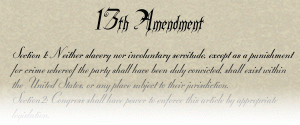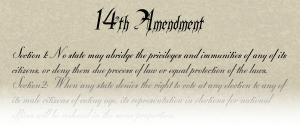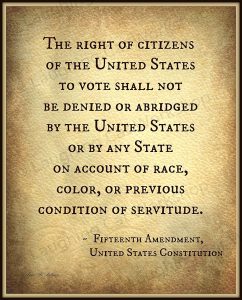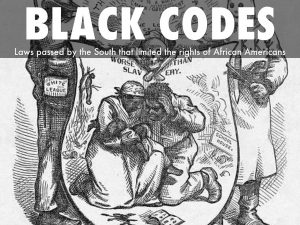The 13th Amendment (1865)

Within the Library of Congress is the bill that would become the 13thamendment, when it was ratified on December 6, 1865. The 13thamendment surrounds the question of slavery in the United States and whether or not it should be abolished. This amendment would come to support the Emancipation Proclamation, which deemed slaves in Confederate territory were free. However, once the war came to a close, Lincoln feared that each state would reverse this order. In its absence, Lincoln needed the 13thamendment to ensure the freedom of African Americans under the constitutional provision. The passage of the 13thamendment had massive ramifications across the country and in every walk of life as it abolished the slave industry, and made Africans Americans no longer bound to white Americans.
The 14th Amendment

The 14thamendment would be a monumental win for Radical Republicans in that section one of this constitutional provision would be used over the next one hundred years as the basis for supreme court decisions which favored equality within the United States. This is all because within section one it includes ideas such as dues process, citizenship, equal protection, and privileges & immunities. While the 13thamendment freed them for slavery, this amendment made them citizens and thusly gave them the legal protections that came with it in the hopes of ensuring prosperity for African Americans in a legal manner. This, as a result, influence southern government in particular after the Great Compromise of 1877 in that the new governments could not overtly subvert the rights of African Americans, as legally they were protected.
The 15th Amendment

Towards the conclusion of Reconstruction president Ulysses S. Grant promoted persuaded the Republican party to enfranchise black male voters as a measure to protect the party. The proposed amendment would eliminate the voting restriction on the basis of race, color, and previous servitude. By 1870 the 15thamendment was enacted and had the influence of allowing African Americans who previously did not have the ability to vote, the constitutional right to do so. However, southern states not too long after would devise voter restriction laws which did not directly neglect the statutes emplaced in the amendment but made it increasingly difficult for African Americans to exercise their new found right. Though these injustices would be eliminated by other legal decisions like Guinn v United States and the Voting Rights Act of 1965.
Black Codes

Following the conclusion of the Civil War states across the country put into place laws known as the Black Codes. This legislature was made in the hopes of establishing a racial hierarchy and a system in which the white populous could restrict the rights and economic mobility of African Americans. Black codes across the country did vary on a state by state basis. For example, in Mississippi had Black Codes which included stipulations for Penal laws, Vagrant laws, and marriage codes. In particular that relationships between the races could result in jail time in addition to a fine. The last stipulation, in particular, would be disputed in cases like Loving v. Virginia. These codes, however, were very effective in regulating the lives of now freed African Americans and ensuring an unequal system with whites at the top.
